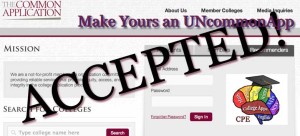 By far the most commonly asked college supplement writing question and one of the most commonly asked college interview questions is, why do you want to attend this particular institution?
By far the most commonly asked college supplement writing question and one of the most commonly asked college interview questions is, why do you want to attend this particular institution?
- Why are you interested in Central Connecticut State University?
- Why are you drawn to the area(s) of study you indicated earlier in this application?
- Why Tufts?
- How will you explore your intellectual and academic interests at the University of Pennsylvania?
- What is it about Yale that has led you to apply?
- Tell me, why do you want to go here?
Whether in the form of a writing prompt or an interview question, there are many other variations on this theme, and ALL of them indicate that admissions officers at many colleges and universities are interested in knowing YOUR SPECIFIC REASONS for applying. Having read many, many of these essays and having heard many admissions officers speak about this question, I can assure you there is a right way and wrong way to go about answering it, whatever the context.
First, there’s some good news here. Unlike your 250-650 word main essay on the CommonApp, when asked in writing, the expected response is much shorter (typically 250 word max). They’re looking for a paragraph, perhaps two. That’s all. Similarly, there is no expectation of creativity, anecdotes, or many of the other intangible elements of a great personal essay (see, for example, Prepping for the Personal Essay: Who Are We and How Did We Get This Way?). This assignment, whether asked in writing or during an interview, is a much more straightforward proposition based on demonstrable facts about your interests and their school.
Key #1: Lead with your intellectual and academic interests
Remember that whatever college or university you’re apply to, it is an institution of high LEARNING. Not higher community service. Not higher sports. Not higher performing arts. Not higher internships. Although specific community service, athletic, performing arts, and internship opportunities certainly have a place in your response, don’t start with them. As indicated even in the small sampling of actual supplement essay/interview questions above, it’s not hard to understand that admissions officers first want to hear about what you most hope to LEARN in college. Are you drawn to the school’s 5-year BA/MA program in Psychology? Are you looking forward to majoring in Women’s Studies with a minor in French Language that is a featured course of study at a given college? Are you looking forward to studying neuro-plasticity and pursuing the most rigorous premedical courses available to you en route to medical school? Are you eager to participate in the new Entrepreneurial Studies and International Business major at the University of X? Tell them about your intellectual interests and THEN move on to supporting interests and activities.
Key #2: Demonstrate your Informed Interest (See also A Brief History of College Courtship: Interest –> Demonstrated Interest –> Informed Interest)
Whatever variation of the “why do you want to go here?” question you encounter, understand that it implies a little more than meets the eye: admissions officers, typically proud representatives of a beloved college or university, want to know what you think you can get out of an undergraduate experience at their school that you can’t get anywhere else. Addressing this implicit part of the question involves some research—on the school website, at info sessions, on official tours, in discussion with current students and faculty, preferably all of the above. The more details you know about programs, course sequences, particular majors and minors, study abroad programs, internships tied to academic study, and professors and their work, the better positioned your are to demonstrate informed interest about the institution. The game is to convince committees that you are in the precise market to buy just exactly what it is they’re selling. You’ve been to the dealership, checked out all the models, kicked some tires, and taken a test drive or two, and you KNOW the car you want to buy.
In short,
You should NOT lead with:
- Location (e.g., I always wanted to study in Boston! or Washington, D.C., or, yuck, the Big Apple)
- Current students (e.g., the love of my life goes here; all my best bros go here)
- The school’s great reputation. Trust me, they KNOW they have a great reputation. They really don’t need to hear about it from you.
You SHOULD lead with:
- Specific academic and intellectual interests you want to purse at that particular school; research the specific departments in which you are likely to declare your major and/or minor and pay careful attention during college visits, especially during info sessions, tours, interviews, and when regional directors bring a dog-and-pony show to your school or local college fair. If you listen carefully, you’ll hear a school representative tell you what they think is awesome about their school. And lo! that’s just what you want!
You SHOULD draw information from:
- Campus visit(s)
- Info session (ask M&D to take notes!) and tour – See also Parent Tip #23: Take Notes During Info Sessions
- College website
- Guidance counselor
- College Fair intel
- Discussions with faculty and current students
- Classes you attended or other activities in which you participated while on campus
SPECIFICS ALWAYS BEAT GENERALITIES!
Check out CPE’s awesome summer CommonApp Boot Camps and fall CommonApp Workshops; take it in West Hartford, CT, or from anywhere else ONLINE via your desktop, laptop, tablet, or smart phone 🙂

